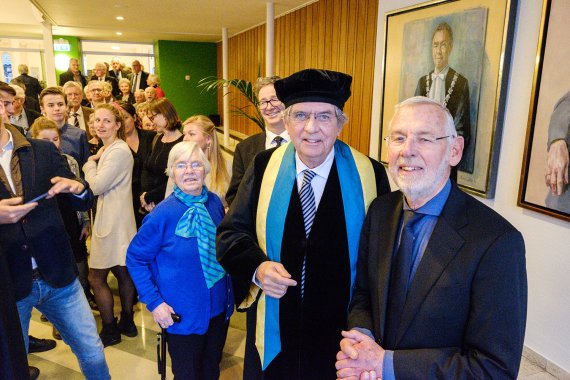© Guy Ackermans
Kees Veerman is the third oldest Wageningen PhD candidate ever. However, he did set another record. Veerman obtained his degree from Emeritus Professor Olaf van Kooten (recently retired) and was questioned by opponents Vinus Zachariasse (former LEI director), Jozef Tettero (professor at the University of Amsterdam) and former minister Cees Veerman – all of whom have long retired. Ruud Huirne, director Food & Agri at Rabobank, was the youngest among the eminent silver on the podium. The average age of the audience in the Auditorium was also well above retirement age.
Not related
There was another unique aspect of the defence: the candidate Kees (in full: Cornelis Pieter) Veerman was questioned by former minister Cees (in full: Cornelis Pieter) Veerman. ‘I first thought a mistake had been made, as C.P. Veerman already graduated from Wageningen in 1983’, said Cees Veerman (the minister). On a side note: the two are not related.
Retirement
A long cherished wish came true for PhD candidate Veerman. When he obtained his university degree (Dutch: doctoraal) in business economics from the University of Amsterdam in 1980, he was told what the doctorandus title truly meant: ‘he who studies to become a doctor’. In other words: he was not done yet, as he still had a promotion on the path ahead. It was not until 2005, after retiring from the agricultural university of applied sciences in Delft, that he finally found the time for his PhD research.
Hot topic
At the time, there was a hot topic in the Dutch horticulture. In 1997, The Greenery was founded; a company that did not only merged fruit and vegetable auctions, but also bought the procurement organisations of the supermarkets. Consequently, a shift took place for vegetables from being sold through auctioning, where prizes were formed in the classic supply-demand process, to negotiations and mediation. A lot of criticism against this ‘vertical concentration’ was voiced by the horticulturists.
Results
After his retirement, Kees Veerman investigated what was wrong with The Greenery. To do so, he compared the greenhouse vegetables sector with the cut flower sector, where the auctions held by FloraHolland kept the price formation in its old form. He was able to convince the Dutch Federation of Agriculture and Horticulture (Land- en Tuinbouw Organisatie, or LTO) to finance his research and started interviewing dozens of greenhouse vegetable companies and cut flower companies as well as assessing their financial results. He also studied the annual reports of the auction, sales cooperatives and commercial ventures. This led to an impressive amount of data.
At odds
Veerman initially started his PhD programme under Amsterdam economist Jozef Tettero, but in 2012, the latter contacted Olaf van Kooten, professor of Horticulture in Wageningen, to bring in additional knowledge on greenhouse horticulture into the programme. Van Kooten and Veerman were immediately at odds. ‘He was rather biased. The vertical integration of The Greenery was bad, the approach of FloraHolland was good. But the problem was that he could not prove this using his research data. One cannot draw general conclusions based on a single case – in this case, The Greenery.’
Bunte
With this feedback, Veerman continued working on his manuscript. But it was rejected by the reading committee two years ago. ‘Not a single corporate or sector characteristic had any influence on the gross income of the horticulturists’, says Van Kooten. But Wageningen economist Frank Bunte saw opportunities. Together with Veerman, Bunte performed econometric analyses, allowing the PhD candidate to draw conclusions this week after all.
Margin
His initial assumption – the auction leads to a better market position and price for the horticulturists than the price mediation of The Greenery – could not be proven through his research. But he did establish that large greenhouse vegetable companies do not reach a higher margin than the smaller ones, and that, on the contrary, smaller companies in floriculture reach a higher margin, also because they provide products in a specific market segment.
Nerves
Veerman was fiercely questioned by his opponents, who were each very well acquainted with the subject. Huirne finances many horticulturists at the Rabobank, Veerman (the minister) was founder of The Greenery, and Zachariasse was supervisor at The Greenery. ‘I was unable to formulate proper answers to many questions’, Veerman (the candidate) says the next day. ‘It might have been the nerves.’ But he did obtain his PhD, albeit by a narrow margin, at the ripe age of 77. Promotor Olaf van Kooten praised him for his perseverance.

